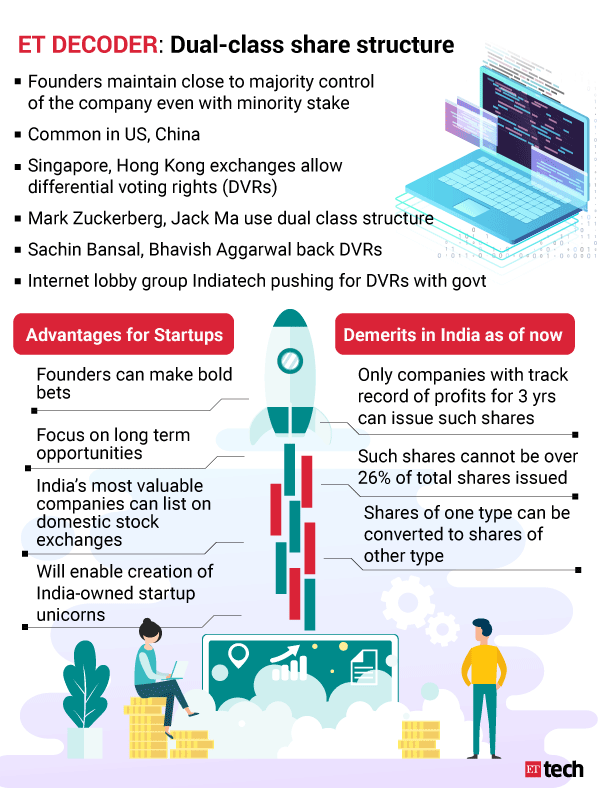Facebook’s CEO and founder Mark Zuckerberg has close to 54% voting rights in the company where he holds roughly 28% of class B shares. Why are his voting rights so much higher? What are class B shares? Some companies have two types of share classes, one with enhanced voting rights and the other with limited voting rights; these are known as dual class shares. In case of Facebook, the class B shares have 10 votes per share. Dual class shares help the promoter retain management control and give limited voice to other shareholders.
Context: The Securities and Exchange Board of India (Sebi) issued a draft framework to allow domestic companies to issue shares with differential voting rights (DVRs).If approved, companies will be allowed to issue shares with either fractional or superior voting rights.
For Indian companies, there is a provision of creating differential shares for diluting stake. These are called differential voting right shares or DVRs; similar to dual class shares, voting rights on DVRs are different from those of the regular shares issued by the company.
- The move will particularly help new-age companies and promoters as they will be able to retain decision-making powers without diluting too much control. It will also act as a mechanism to stave off hostile takeovers, which have become a concern among companies with low-promoter holding.
- The current regulatory framework doesn’t permit DVRs with higher or superior voting rights.
- Sebi has proposed dual-class share framework with superior voting rights, where a share will have higher voting power than an ordinary share.
- This, however, will be restricted only to unlisted companies.
- Listed companies will be permitted to issue shares with inferior voting rights, where a share will carry a fraction of voting power compared to an ordinary share. Besides voting power, these shares could carry other rights like higher dividends.
- Sebi has proposed to allow unlisted companies to issue superior right (SR) shares. Also, companies that issued SR shares will be allowed to come out with an initial public offering (IPO). Sebi has, however, said that only ordinary shares can be issued in the IPO.
- The SR shares will come with a “sunset clause”, where they will be converted into ordinary shares after five years of their issuance.
- In India, five companies such including Tata Motors, erstwhile Pantaloons Retails and Gujarat NRE Coke had issued shares with DVRs. In 2009, Sebi had directed stock exchanges to prohibit use of DVRs.
Significance : The new-age firms, continuously require to grow only through equity, which dilutes the founder’s stake, thereby diluting control. In such cases, retaining the founder’s interest and control in the business is of great value to all shareholders.
The need for dual-class shares in India
- First, outside shareholder control is a myth in Indian firms. Even without dual-class shares, outside shareholders do not enjoy much control.
- Second, the dual-class share structure makes insider control more transparent. It will signal the firms in which insiders enjoy absolute control. This will put greater onus on outside investors to exercise due diligence before investing.
- Third, allowing dual-class shares is the only way we can have an Indian-owned unicorn. In finance, a unicorn is a privately held startup company with a current valuation of US$1 billion or more.
- In the absence of a dual-class share structure, raising outside equity would dilute the insider’s ownership stake and risk loss of control. Thus, in the absence of debt finance, the Indian technology firms are caught between a rock and a hard place. Either depend on internal cash generation to grow and settle for slower growth, or depend on outside equity and risk losing control.
- To avoid this painful choice, it is important to give them an alternative and that will be to issue dual-class shares. This will enable them to grow fast using outside equity while retaining control.
Issue with existing system :
- In a majority of listed firms in India, the insiders own a majority of the shares outstanding. This means that outside shareholder votes are in the minority. If all of the outside shareholders do not like something happening in the firm, they can go to the shareholder meeting and express their displeasure by voting against the proposal. But if the insider owns a majority of the shares, then the outside shareholder votes are symbolic.
- The Satyam Computers scandal. Nobody could fault its board for its quality and independence. It had members whowere world-renowned experts in accounting and corporate governance. However, the board was in the dark for an extended period.

Suggested Reading :
- L&T-Mindtree deal makes a case for dual-class shares in India
- Sebi mulls dual-class structure to prevent hostile takeovers
- Opinion | The need for dual-class shares in India
- What is the purpose of dual class shares?
- List of unicorn startup companies – Wikipedia
- India’s Byju’s, Zomato, OYO, Swiggy, Udaan became unicorns in 2018 — Quartz India